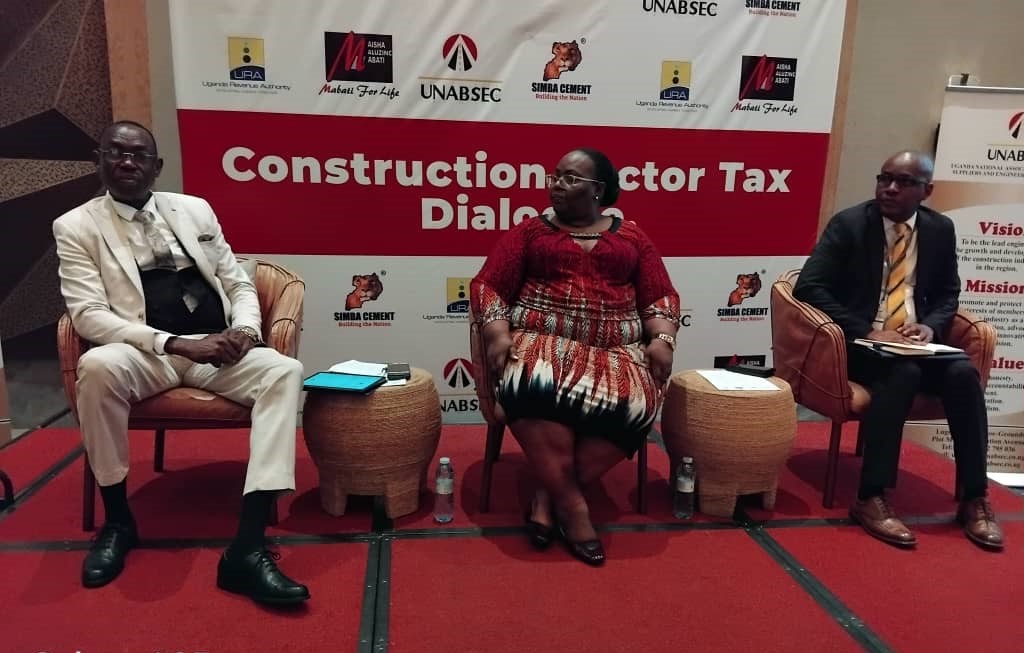In a crucial meeting aimed at strengthening tax compliance within the construction industry, the Uganda National Association of Builders, Suppliers, and Engineering Contractors (UNABSEC), in collaboration with the Uganda Revenue Authority (URA) and National Cement Company Uganda, came together to discuss tax regulations affecting the sector. The dialogue was designed to address concerns related to taxes on supplies and non-tax revenue, while also helping new players in the industry navigate tax compliance requirements.
The construction industry plays a significant role in Uganda’s economic development, ranking second only to agriculture in its contribution to the national Gross Domestic Product (GDP). The meeting between UNABSEC and URA highlights the growing importance of this sector and the need for consistent tax regulation that supports both business growth and government revenue collection.
The UNABSEC President, Jamesone Olonya, pointed out that many new businesses in the construction industry lack awareness of tax regulations. He stressed that tax compliance sensitization from URA is essential for these businesses to thrive and contribute effectively to Uganda’s economy. With many new players entering the market, ensuring that they understand the importance of proper tax practices is key to sustaining growth in the industry.
One of the major concerns raised during the meeting was the lack of awareness among some construction companies regarding tax obligations. This can lead to non-compliance, which may result in penalties, legal issues, or business closure. To mitigate this, URA has committed to offering educational programs to help companies, particularly newer ones, comply with existing tax laws and regulations.
Jamesone Olonya emphasized that taxation in the construction industry needs to be approached with clarity, especially in regard to taxes on supplies. Companies often face difficulties when navigating the taxation landscape, particularly when it comes to distinguishing between taxable and non-taxable supplies. By improving tax education, these challenges can be reduced, allowing businesses to focus on innovation and growth.
Let Us Build Your Online Success!
We are the experts in creating visually stunning and functional websites. With reliable hosting and exceptional customer support, we bring your vision to life. Join hundreds of happy clients who trust us!
Get Started Now📞 Call/WhatsApp: +256 207 800 192
As the leading organization for builders, suppliers, and engineering contractors in Uganda, UNABSEC plays an instrumental role in advocating for a business-friendly tax environment. The association continuously works to bridge the gap between the private sector and tax authorities, ensuring that members are well-informed about the latest tax regulations.
During the meeting, UNABSEC reiterated its commitment to working closely with URA to streamline tax processes for the industry. The goal is to create a more transparent and predictable tax environment, reducing the compliance burden on businesses and encouraging more participation from informal sector players who may otherwise operate outside the tax net.
The participation of the National Cement Company Uganda in the discussions adds another layer of importance to the collaboration. As a key supplier of materials in the construction sector, the cement industry plays a pivotal role in shaping the cost structure of construction projects. Cement, being one of the largest expenses in most construction projects, directly impacts overall project costs and profitability. Ensuring that companies like National Cement are fully compliant with tax regulations helps stabilize the sector’s economic contributions.
Moreover, with ongoing infrastructure developments across Uganda, from road construction to real estate projects, there is increasing demand for cement and other construction materials. This makes it imperative for all stakeholders to operate within a well-regulated framework that supports long-term growth while ensuring government tax collection is optimized.
A major outcome of the meeting was the decision to introduce more sensitization programs targeted at newer companies in the construction industry. These programs will focus on simplifying tax laws and ensuring that businesses, regardless of their size, understand their tax obligations. The construction sector, with its many small and medium-sized enterprises (SMEs), can benefit from this proactive approach, as it reduces the likelihood of unintentional non-compliance and helps companies avoid costly penalties.
In the coming months, URA plans to roll out these educational initiatives through workshops, seminars, and digital platforms to reach a broader audience. By doing so, they aim to increase the number of companies filing their taxes correctly and on time, while fostering a culture of compliance within the industry.
In addition to traditional tax obligations, the meeting also addressed the issue of non-tax revenue, which refers to other forms of income that the government collects outside direct taxation. This includes licensing fees, permits, and other service-related charges that construction companies need to pay. Both URA and UNABSEC stressed the importance of adhering to these requirements, as they contribute to the overall financial stability of the industry and the country.
Efficient collection and regulation of non-tax revenue ensure that the construction industry remains sustainable and continues to attract both local and international investments. By following a structured approach to compliance, businesses in Uganda’s construction sector can play a more active role in national development and infrastructure improvement.

